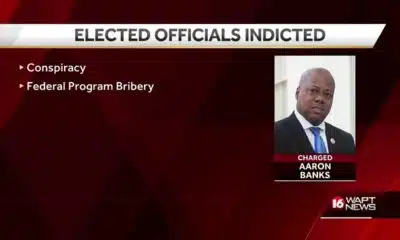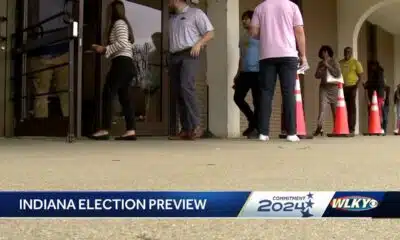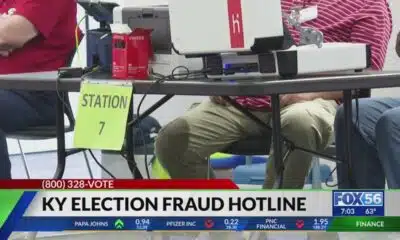Mississippi News
More questions than answers at 3-year mark of welfare scandal- Mississippi Today
‘It doesn’t look good’: At 3-year mark, more questions than answers in Mississippi welfare fraud scandal
“It doesn’t look good.”
Former Gov. Phil Bryant’s own words about his role in the state’s welfare fraud scandal are a great understatement.
And now at the three-year mark since investigators began nibbling at the edges of what state Auditor Shad White has called the largest public fraud case in state history, things still don’t look good. But there remain as many questions as answers on how at least $77 million in federal welfare dollars was stolen or misspent. And by whom.
The questions in chief: Is the case being thoroughly investigated, top to bottom, and will all those responsible be held accountable? Have punches been pulled because of politics or celebrity?
READ MORE: Phil Bryant had his sights on a payout as welfare funds flowed to Brett Favre
Revelations about involvement of Bryant and former NFL star quarterback Brett Favre have fueled these questions. Text messages obtained by Mississippi Today have revealed that Bryant was at least briefed through texts about the flow of state money from welfare officials he oversaw to a private pharmaceutical venture Favre was backing. Bryant was set to accept stock in the company hours after he left office — until the auditor made arrests in the case.
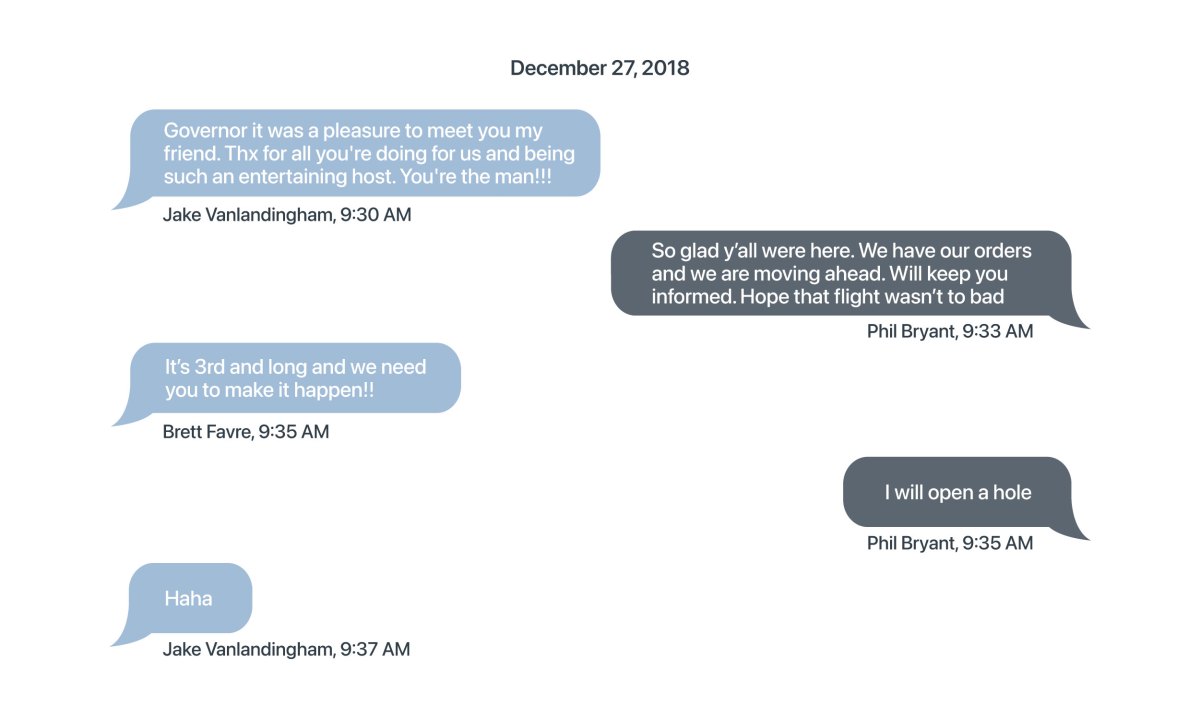
The state auditor and Hinds County district attorney charged six people in early 2020, and four have pleaded guilty to the state charges – some as serious as bribery and racketeering. The state recently filed a lawsuit to attempt to “claw back” $24 million in misspent money from 38 people or companies, including Favre and the pharmaceutical venture’s owner. But to date, neither Bryant nor Favre have faced criminal charges or, at least to the public’s knowledge, the same scrutiny others faced.
It’s unclear where any continuing federal or state investigations stand at the three-year mark. No further arrests have been made since February of 2020. Interim Southern District U.S. Attorney Darren J. LaMarca and the U.S. Department of Justice declined comment.
This has raised questions, in particular, about state Auditor White, who spearheaded the initial investigation and charges with a local DA — for eight months — without involving federal authorities despite the case involving millions of federal welfare dollars. White has explained that he made arrests to stop the flow of funds to the allegedly corrupt nonprofits and afterward turned all evidence over to federal authorities.
But questions about if and when White’s office alerted other authorities to Bryant’s text messages remain. The auditor’s office refused to turn the messages over to Mississippi Today after a public records request, and the outlet has a pending Ethics Commission records complaint against the office.
Did White and his investigators know Bryant was in talks with the company at the center of the embezzlement scandal when they made the arrests, which derailed Bryant’s business arrangement with the company?
Also, there are questions about a forensic audit ordered up by the state Department of Human Services and White’s office, whether the state put too many limitations on the firm conducting the probe.
Should auditor have informed feds he was investigating for months?
White’s close relationship with Bryant — who directly supervised his welfare director as taxpayer money flowed to people and programs the governor favored — has been questioned. Recently, three former state auditors said White should have recused himself or limited his involvement in the initial investigation to avoid perception of conflict of interest.
White ran Bryant’s 2015 reelection campaign, worked for Bryant in the lieutenant governor’s office and was initially appointed auditor by Bryant, who then helped White win election to the post.
White’s office gathered the messages between Bryant and Favre in early 2020, but some parties to the cases hadn’t seen them until almost two years later, sources told Mississippi Today, raising questions about when the auditor’s office alerted other authorities to their existence.
White, who has often declined comment citing a long-running state judge’s gag order on the case, on social media blasted such questioning in Mississippi Today articles, calling it “garbage reporting” and a liberal attack. He said he would no longer speak with Mississippi Today.
READ MORE: Former auditors question whether Shad White was too close to investigate Phil Bryant
“Guess what? I did hand it to another law enforcement agency,” White tweeted recently. “After our initial arrests, I gave the FBI access to everything we have over two years ago. They have even worked from my office on the case. Between all of us, this case will be fully investigated. Period. … The reporting contains a blatant lie. ‘Questions about if and when White’s office alerted other authorities to [Bryant’s] text messages remain.’ Questions do not ‘remain.’ The FBI has had access to everything we have for years. That answers the ‘questions.’”
But experts in major federal investigations and criminal forensic auditing said there are some unusual or questionable aspects of the case to date.
“What’s really unusual is for (the state) not to reach out to the feds in a matter like this,” said law professor and former Alabama U.S. Attorney Joyce Vance, referring to White’s office and a local DA bringing indictments and arrests without involving the FBI or U.S. attorney.
“Everybody likes to handle their own cases when they’ve found something, but in many ways the feds are able to bring in better resources,” Vance said. “… The federal government has better resources but can also move more quickly. It also typically has better statutory remedies — meaning people spend more time in prison if that matters to you in these types of cases.”
Vance said Mississippi’s welfare fraud case “implicates uniquely federal interests when you’ve got federal money involved.”
“The state auditor went to the DA, and the DA didn’t call (the feds) as a courtesy, either?” Vance said. “That’s a little unusual.”
Hinds County District Attorney Jody Owens told Mississippi Today he did email a courtesy notice to the U.S. attorney’s office, but not until a day or two before the state secured indictments. This was after the state auditor had investigated for eight months. At the time, in early February 2020, then U.S. attorney Mike Hurst issued a release complaining, “We in the United States Attorney’s Office and the FBI only learned (the day of the arrests) from media reports about the indictments and arrests, at the same time the general public did.”
Hurst in the release said his office caught wind of the investigation and reached out to the auditor and DA and was given some information about the investigation the day before the arrests, but “… Neither the FBI nor the United States Attorney’s Office was contacted by the state Auditor or the Hinds County District Attorney about this investigation, although millions of federal dollars are alleged to have been stolen.”
James T. Wood, founder of Utah-based Venture Forensics, is a former longtime FBI forensic accountant and former head of the FBI’s Forensic Accountant Support team at FBI headquarters in Washington, D.C.
Wood said the state not involving federal authorities in the initial investigation and indictments is “an odd scenario.”
“I understand from reading about this that (White) said the feds take a long time to do anything,” Wood said. “Part of that is that they are thorough and when they bring an indictment they want to make sure their ducks are in a row … I do think it’s odd that they weren’t notified … The magnitude of the dollar amount here is not insignificant. It would be one thing if this were just $10,000 in TANF funds, the feds might not care.”
Vance said that in many states, federal and state authorities have good relationships and can hand off to each other to avoid perception of political conflicts of interest.
“But this is a different situation than that sort of usual reciprocal behavior,” Vance said, “because this implicates uniquely federal interests when you’ve got federal money involved.”
But both Vance and Wood said that just because the welfare scandal has dragged on for three years without federal authorities announcing action doesn’t mean the feds aren’t working on it.
“You won’t get any insight from them until there’s either an indictment or not,” Vance said.
Wood said: “I guess I might be surprised if there isn’t a federal investigation going on given the magnitude and the fact that it’s federal funds.”
But the question remains: Did the state’s decision to bring charges on its own stymie or delay federal intervention, or give others involved a chance to take cover?
Why was the forensic audit of welfare spending limited?
Other questions remaining about the case involve a forensic audit ordered up by DHS and the state auditor’s office after initial malfeasance was spotted.
The prominent national accounting firm Clifton Larson Allen was hired for up to $2.1 million to get to the bottom of where the state’s welfare money went. This report is what led the state’s lawsuit to try to recoup some of the money from people and companies.
But the forensic audit firm was limited in what and whom it was able to examine in its probe. In its audit reports delivered in September of 2021, CLA noted that it was not given access to former DHS Director John Davis’ computer hard drive and it was initially limited in whose emails it could examine.
“CLA was unable to obtain a copy of John Davis’ MDHS hard drive, as it was in the possession of the (Office of State Auditor) investigative division. Additionally, the scope of work limited CLA’s review of emails to include only John Davis’ MDHS emails. If other electronic evidence had been made available to CLA, additional information not currently known to CLA could impact the findings communicated in this report.”
MDHS explained that it asked CLA to review John Davis’ work emails as a starting point, and said that the firm was given freedom to review anything else in the agency’s possession the auditors deemed relevant. MDHS deferred Mississippi Today’s questions about why the auditor’s office did not let CLA examine John Davis’ hard drive to the auditor’s office and the auditor’s office has refused to respond to Mississippi Today’s questions.
CLA also noted that it was not provided records from Mississippi Community Education Center, the nonprofit at the center of the fraud scandal, and that MCEC did not cooperate with its probe. It’s unclear how many of these documents the auditor possessed but did not turn over to CLA – such as MCEC’s contract with Brett Favre for promotional activities, which was not discussed in the forensic audit. The firm also noted it was not allowed access to John Davis’ personal finances.
“To the extent that CLA was limited in their ability to review records, MDHS was disappointed that the issues could not be fully explored in the forensic audit,” MDHS Director Bob Anderson told Mississippi Today in a statement.
In an addendum in late April of this year, CLA said it was allowed “expanded email review” by MDHS, with the agency providing the firm emails from a few others, including two other MDHS employees. The addendum still did not explore Bryant’s or Favre’s involvement in welfare spending.
Wood, who reviewed CLA’s audit reports, said, “I would say that scope limitation is odd.”
“I think that’s a fair question,” Wood said. “… The fact that (CLA) noted it in their report is what we call a scope limitation. It’s odd that they were not allowed access to the entire hard drive … It’s odd because the (Office of State Auditor) had it, so it wasn’t a situation where it was destroyed or the hard drive failed or something. It sounds like they have it, and I’m puzzled why they wouldn’t let them look at it.”
Wood said it also appears unusual that CLA was thwarted in trying to get nonprofit MCEC’s records.
“Were they not allowed to go up the ladder to the governor?” Wood said. “Sounds like from what you guys have uncovered, and from what’s cited in the OSA’s (earlier audit) report — it mentions Favre Enterprises — it strikes me as odd there’s no mention in CLA’s report of any of that. They did mention that they’ve reviewed the OSA’s report, and maybe they didn’t want to duplicate things.”
“There may be a reason why, but I’m surprised that there’s nothing discussed in their report about that,” Wood said. “OSA’s report mentioned a number of entertainers and things that they found were questionable … Usually a forensic audit is going to look at as much as possible. I’m not criticizing CLA’s work — It looks like they did it the right way as far as I can see.
“… It’s an interesting situation where OSA brought those actions, and then the state hires an independent audit firm, but then limits the scope of that audit,” Wood said.
THE BACKCHANNEL: Full coverage of Mississippi’s welfare scandal
The forensic audit helped the state Attorney General’s office craft its civil lawsuit trying to recoup misspent money intended to help poor people. While the lawsuit highlights the taxpayer dollars going to the private pharmaceutical venture, it does not scrutinize the role of former Gov. Bryant. Besides Favre, the lawsuit targets former football stars Marcus Dupree and Paul Lacoste, retired WWE wrestler Ted “The Million Dollar Man” DiBiase Sr. and his two sons, among others.
None of the audit reports or MDHS’s lawsuit contain relevant details reported in Mississippi Today’s investigative series, “The Backchannel,” such as Brett Favre’s communication with Bryant about pharmaceutical company Prevacus; a calendar entry in which John Davis recorded that the governor and Favre requested he meet with Prevacus; the athlete’s communication with Nancy New, John Davis and the governor about funding the volleyball facility; Nancy New’s relationship with the governor’s great nephew; or Bryant’s casual requests to John Davis to fund his favored vendors.
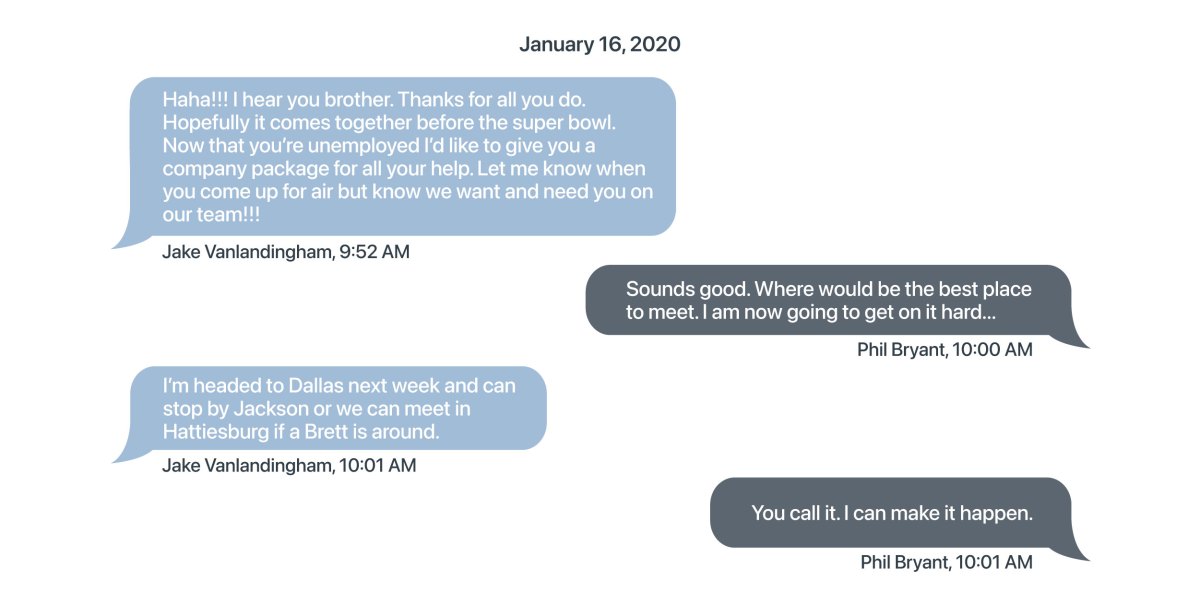
The lawsuit also fails to target numerous others involved in alleged misspending of welfare dollars. Notably, two entities that received welfare money through activities referenced in criminal proceedings — the University of Southern Mississippi Athletic Foundation and tech company Lobaki Inc. were not named in the suit.
Nonprofit MCEC’s director Nancy New and assistant director Zach New admitted to defrauding the government of $865,000 for a Lobaki virtual reality center and program. Zach New admitted to fraud by transferring $4 million in welfare money for the construction of a volleyball stadium at USM, disguised as a lease.
State officials have not said whether the state will try to recoup all misspent money from these entities or others that received payments auditors have questioned.
The News also recently pleaded guilty in a separate federal case involving public funding they bilked for their private schools. But in the state case, the News received a favorable plea deal that keeps them out of the state penitentiary, allowing them to avoid any more prison time for charges related to the welfare scheme, as long as they cooperate with the ongoing investigation. Such a deal suggest they may have valuable information prosecutors could use to pursue someone higher up the chain.
Bryant in a lengthy sit-down interview with Mississippi Today appeared to at least understand why people have more questions about the case.
“Now I can clearly see why you’re following those trails,” Bryant said. “And it doesn’t look good. Should I have caught it? Absolutely. I should’ve caught it. Was I extremely busy as governor? I can’t even describe to you what it is like on a daily basis as governor. This was not on the top of my list. This was not something that I was looking at every day. I’d get a text and it just kind of glance through it. I’d say, ‘Good,’ and I would go on and try to work on something really important for state government.”
Reporter Anna Wolfe contributed to this report.
This article first appeared on Mississippi Today and is republished here under a Creative Commons license.
Mississippi News
Events happening this weekend in Mississippi: July 11-13
SUMMARY: From July 11-13, Mississippi offers a variety of events for all ages. In Jackson, enjoy the season finale of “Late Night with Rita Brent,” Disney’s The Lion King, Jr., and exhibitions at the Mississippi Children’s Museum. Pearl hosts the Mississippi Mud Monsters with fireworks and a Back 2 School Bash. Ridgeland features the Wildflower Field, Art Park, Renaissance Christmas in July sales, and a Fairy Garden Workshop. Natchez and Vicksburg offer farmers markets and local entertainment. Hattiesburg presents Po Boy Fest, Clue: The Musical, and outdoor movies. Activities include rodeos, ice cream tastings, run clubs, and community tennis events across the state.
The post Events happening this weekend in Mississippi: July 11-13 appeared first on www.wjtv.com
Mississippi News
Death toll from catastrophic Texas flooding passes 100
SUMMARY: Catastrophic flooding in Texas over the July Fourth weekend killed at least 104 people, including 28 children, mostly near Camp Mystic, a century-old girls’ summer camp in Kerr County. Search-and-rescue teams continue to search swollen rivers for dozens still missing; officials expect the death toll to rise as more rain threatens the saturated area. Many victims were swept from cabins by flash floods early Friday, some clinging to trees. Authorities will investigate warnings and evacuation delays, noting poor cellphone service hindered alerts. Despite warnings issued before the flood, some residents didn’t receive them. President Trump plans to visit the state.
The post Death toll from catastrophic Texas flooding passes 100 appeared first on www.wjtv.com
Mississippi News
LIVE: Officials give updates on Texas floods
SUMMARY: Crews in central Texas continue searching for victims after catastrophic July Fourth weekend flooding killed over 80 people, including 27 campers and counselors at Camp Mystic along the Guadalupe River. The floods, some of the worst in decades, struck overnight, sweeping away tents and cabins. With more rain forecast, authorities warn the death toll may rise as many remain missing. Survivors described clinging to trees or fleeing to attics. Officials face scrutiny over flood warnings and emergency response. President Trump declared Kerr County a disaster area, pledging support while criticizing FEMA’s performance.
The post LIVE: Officials give updates on Texas floods appeared first on www.wjtv.com
-
News from the South - Georgia News Feed7 days ago
'Big Beautiful Bill' already felt at Georgia state parks | FOX 5 News
-
The Center Square5 days ago
Here are the violent criminals Judge Murphy tried to block from deportation | Massachusetts
-
News from the South - Kentucky News Feed5 days ago
Woman arrested in Morgantown McDonald’s parking lot
-
News from the South - Texas News Feed7 days ago
Hill Country flooding: Here’s how to give and receive help
-
News from the South - North Carolina News Feed7 days ago
Raleigh caps Independence Day with fireworks show outside Lenovo Center
-
News from the South - Missouri News Feed7 days ago
Shannon County Sheriff alleges ‘orchestrated campaign of harassment and smear tactics,’ threats to life
-
News from the South - Kentucky News Feed6 days ago
Cruising into Louisville: Viking cruise ship docks downtown on Ohio River
-
Our Mississippi Home7 days ago
The Other Passionflower | Our Mississippi Home


